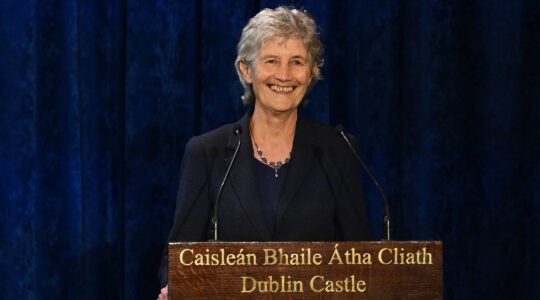MOSCOW (JTA) – Leia Berlin apparently harbors no illusions about the difficulties she is facing as the new permanent country director for Hillel: The Foundation for Jewish Campus Life in Russia.
“I’m a little overwhelmed, to tell the truth,” she says, laughing.
It’s no wonder. After all, Berlin is responsible for revamping what is widely seen as a sagging brand in the former Soviet Union and coordinating the efforts of 15 communities.
For nearly two years the Russia Hillel conducted a search for a permanent country director, who guides countrywide policy and monitors the far-flung communities in the country.
Berlin, 34, comes to the position after serving on the board of the Young Leadership Division of the Jewish Community Federation of Cleveland. She became an American citizen after immigrating to Cleveland from her native Moscow in 1996, but returned in April of this year to launch an interactive theater performance.
Those plans have been put on hold while she focuses on Hillel. Berlin has been heading the organization since July 1, although Hillel has not publicly announced the hiring.
“I came because I’m very passionate about making the world a better place,” the soft-spoken Berlin said from her new office in central Moscow.
The decision to hire Berlin, who although ostensibly a native Russian has lived for so long outside the country, illustrates just how difficult a position Hillel finds itself in Russia in finding talent.
“I know they worked hard to find someone,” Berlin said. “For them it was a really hard job.”
Based on Hillel’s track record in Russia, Berlin seems to have her work cut out for her.
The organization has a somewhat anemic reputation among Jewish organizations in Russia. Its decision to forgo establishing a presence on university campuses, the crowded field of competition among Jewish agencies here and a lack of consistency in its leadership has left many Jews wondering just what Hillel does here.
“The perception, although it’s an old, strong brand, is that it’s kind of a JDC for youngsters,” said Hillel’s Moscow director, Dmitry Maryasis, referring to the American Jewish Joint Distribution Committee, whose free services are similar to those of Hillel, albeit for an older age group.
Part of Hillel’s problem has been an inability to spread the word.
Few Russian universities have campuses in the Western sense. Unlike in the United States and Western Europe, university campuses here are simply places to work and sleep. The historical role that campus organizations hold elsewhere is not a part of life in the former Soviet Union.
“That is why the U.S.-based version of Hillel doesn’t work here,” Maryasis said.
Hillel launched in the former Soviet Union with the opening of its Moscow offices in 1994. Since then the organization has grown to encompass 15 branches throughout Russia.
It opted to focus on a community-based approach, moving away from Hillel’s traditional role as an on-campus organization. The decision has had a negative impact on the group’s ability to reach out to Jews unfamiliar with Hillel. Now students must find Hillel rather than the other way around.
While the group’s sprawling two-floored suite of offices amid the 19th century buildings surrounding Moscow’s Garden Ring is impressive, on a recent afternoon it was conspicuously empty.
Maryasis, who turned down the regional director position, still believes a community-oriented approach can be successful in Russia, if it leaves the confines of Hillel’s offices and engages Jewish youth on their terms.
Toward that end, Maryasis and Berlin are working on a restructuring of Hillel operations in Moscow, starting with a search for a smaller office that would free up funds that would allow the group to pay more competitive wages – a major problem in finding talented Jewish professionals for the organization.
The group also plans to open a club in the center of the city where young Jews can gather and Hillel can hold functions. It’s all part of a plan to make the community-based approach more dynamic.
Berlin has traveled to the Siberian city of Novosibirsk, and recently spent a week in Israel meeting with top Hillel leaders. She plans to visit every Hillel Russian community in the coming months, including Samara, a city in the Volga region where there has been talk of opening the group’s first on-campus offices.
But Berlin doesn’t plan to start from scratch. She sees merit in some of what Hillel has done.
“First,” she said, “I have to find out what’s working.”
JTA has documented Jewish history in real-time for over a century. Keep our journalism strong by joining us in supporting independent, award-winning reporting.





